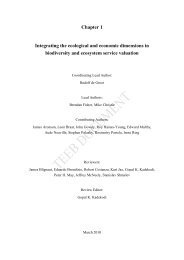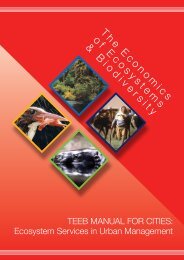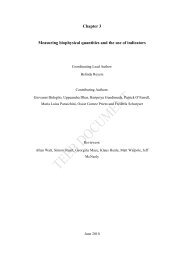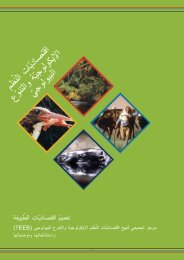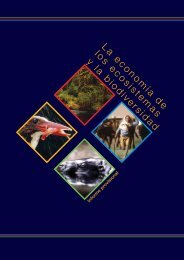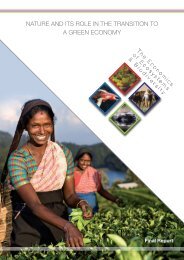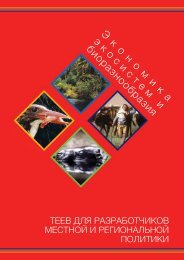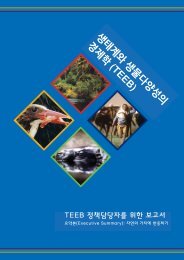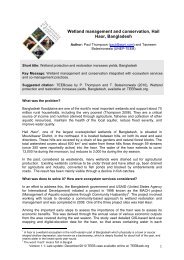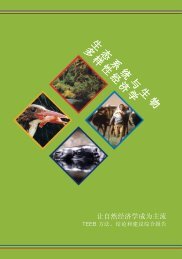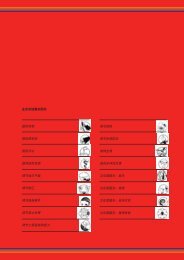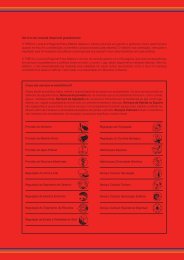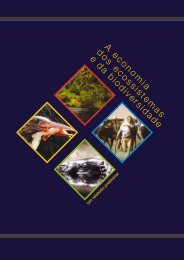Download (PDF, 6.71MB) - TEEB
Download (PDF, 6.71MB) - TEEB
Download (PDF, 6.71MB) - TEEB
You also want an ePaper? Increase the reach of your titles
YUMPU automatically turns print PDFs into web optimized ePapers that Google loves.
Local management is decisive for sustainable use<br />
of natural capital. However, national legislation and<br />
administrative culture sets the framework for local<br />
governance, including the scope for action at different<br />
levels, fiscal federalism and planning procedures.<br />
<strong>TEEB</strong> D2 (forthcoming) illustrates opportunities<br />
for action at the local level.<br />
Building partnerships<br />
More political will, planning and additional resources<br />
are all essential but long-lasting change can only<br />
come by working with and through people. Addressing<br />
and engaging the right actors, means identifying<br />
the very diverse range of stakeholders affected<br />
directly or indirectly by resource use decisions (see<br />
Chapter 2).<br />
This starts with the public and communities – as biodiversity<br />
and ecosystem services are often public<br />
goods. Citizens and NGOs need to be actively<br />
engaged because the most vital issues are at stake<br />
(e.g. food security) and because individual patterns<br />
of behaviour and consumption ultimately determine<br />
the global ecological footprint. This link will be further<br />
explored in <strong>TEEB</strong> D4 for citizens and consumers.<br />
Equally important are businesses, irrespective of<br />
size: for some, their very survival is linked to healthy<br />
ecosystems (think of agriculture and ecotourism).<br />
The <strong>TEEB</strong> D3 report will identify opportunities to<br />
work with and through business to deliver a more<br />
resource efficient economy.<br />
International organisations have a key role to play e.g.<br />
in terms of capacity building and funding. A culture of<br />
assessment, transparency and appreciation of nature’s<br />
value can help to improve governance and the delivery<br />
of policies. Several countries could require practical<br />
support to address the challenges ahead. International<br />
institutions – the Convention of Biological Diversity, The<br />
United Nations Environment Programme, the World<br />
Bank, many donor organisations and NGOs – are<br />
already actively involved in relevant programmes and<br />
training. REDD and similar initiatives will open up new<br />
opportunities for the international community to help<br />
policy development in key areas, especially where ecosystems<br />
provide local as well as global benefits.<br />
RESPONDING TO THE VALUE OF NATURE<br />
10.5.4 BUILDING A MORE RESOURCE<br />
EFFICIENT ECONOMY<br />
Faced with the growing threat from climate change,<br />
governments have started focusing on the need to<br />
move towards a low-carbon economy, an economy<br />
that minimises greenhouse gas emissions. There is<br />
a need and an opportunity to take this concept a<br />
step further towards a truly resource efficient economy.<br />
An economy that sends out signals that reflect<br />
the many values of nature, from the provision of<br />
food, raw materials, access to clean water, all the<br />
way up to recreation, inspiration and a sense of<br />
cultural and spiritual identity; an economy that<br />
makes the best use of the biodiversity, ecosystems<br />
and resources available without compromising their<br />
sustainability; an economy supported by societies<br />
that value their natural capital.<br />
It is hard to think of any other asset where we would<br />
tolerate its loss without asking ourselves what we<br />
risk losing and why. The more that we ask these<br />
questions, the more uncomfortable we become with<br />
the current situation where nature is being lost at an<br />
alarming rate. We realise that we often fail to ask<br />
the big questions about what ecosystem services<br />
and biodiversity provide and their value or worth to<br />
different groups of people, including the poorest,<br />
across the globe and over time.<br />
These questions are not easy to answer. This report<br />
is a contribution to the call by an increasing number<br />
of policy makers for ways to approach this multifaceted<br />
challenge. It shows that the accumulated<br />
policy experience is plentiful and provides a broad<br />
range of solutions. At present these are mainly<br />
carried out in isolation, creating pockets but also<br />
important starting points. The creativity and vision of<br />
international and national policy makers is now in<br />
demand to design coherent policy frameworks that<br />
systematically respond to the value of nature. These<br />
can open up new opportunities to address poverty,<br />
development and growth. At the same time, the act<br />
of making values visible through well-designed<br />
policies will empower consumers and business,<br />
communities and citizens to make much more<br />
informed choices and thus to contribute to this<br />
transition in their daily decisions.<br />
<strong>TEEB</strong> FOR NATIONAL AND INTERNATIONAL POLICY MAKERS - CHAPTER 10: PAGE 30



